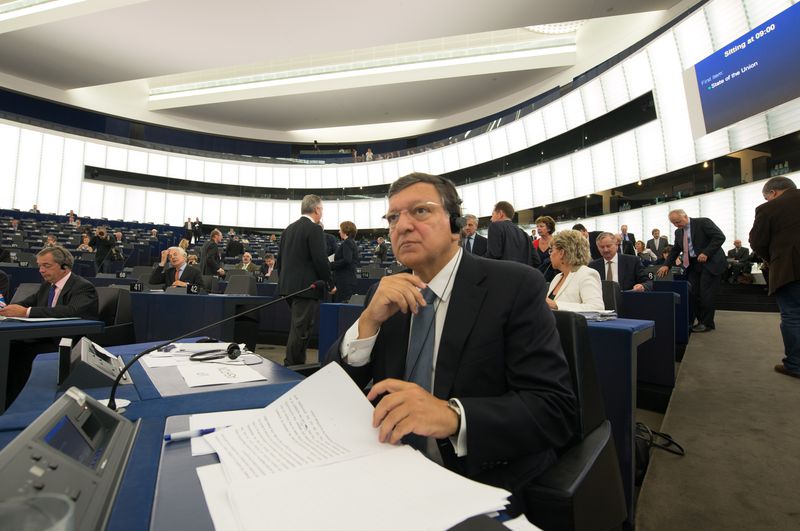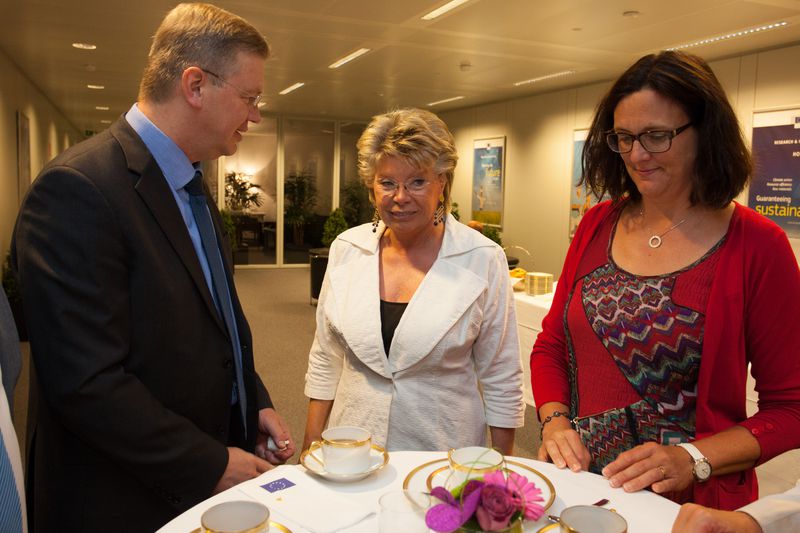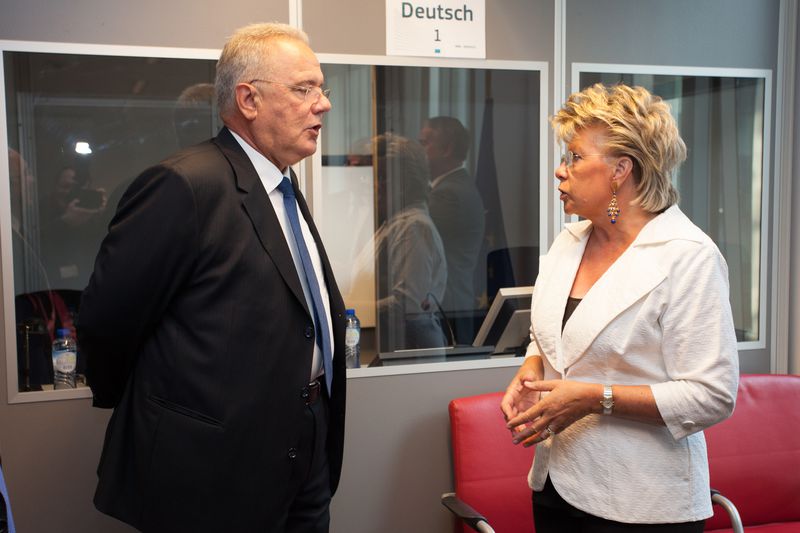The Rule of Law Mechanism Should Be Without Anti-Eastern Bias
, September 13, 2013
 In his state of the union address this year European Commission President Jose Manuel Barroso mentioned the rule of law as one of the fundamental European values that is growingly under threat. It is not his first time to point out to that problem - in his last year's address he, too, said that this was one of the challenges the EU faced that could be resolved by a political union. But, for now, there is no political union on the horizon and that is why in, probably, his last address to the MEPs Mr Barroso announced that the Commission will come up with concrete proposals for the establishment of a single rule of law mechanism. In that statement from September 11th in the European Parliament Croatian media saw criticism against Croatia, which is currently in a conflict with Vice President Viviane Reding who is responsible for justice and fundamental rights, while in Bulgaria Tsvetlin Yovchev, the minister of interior, stated confidently that Bulgaria is a rule of law country and obviously the rule of law lives in full harmony with the Cooperation and Verification Mechanism (CVM) in precisely this area.
In his state of the union address this year European Commission President Jose Manuel Barroso mentioned the rule of law as one of the fundamental European values that is growingly under threat. It is not his first time to point out to that problem - in his last year's address he, too, said that this was one of the challenges the EU faced that could be resolved by a political union. But, for now, there is no political union on the horizon and that is why in, probably, his last address to the MEPs Mr Barroso announced that the Commission will come up with concrete proposals for the establishment of a single rule of law mechanism. In that statement from September 11th in the European Parliament Croatian media saw criticism against Croatia, which is currently in a conflict with Vice President Viviane Reding who is responsible for justice and fundamental rights, while in Bulgaria Tsvetlin Yovchev, the minister of interior, stated confidently that Bulgaria is a rule of law country and obviously the rule of law lives in full harmony with the Cooperation and Verification Mechanism (CVM) in precisely this area.
Mr Barroso did not reveal any details about the upcoming communication nor did it become clear when will it be presented, but a week earlier this did Ms Reding at a special conference on the issue, organised by the Centre for European Policy Studies (CEPS) in Brussels. The rule of law, its interpretation in individual member states, the respect for it and the problems it causes are very well addressed in Ms Reding's speech, which is why we offer you herewith not the entire text, but some essential parts of it:
What is the meaning of the rule of law and why is it of specific importance for the European Union?
The rule of law is the backbone of modern democratic, pluralist societies and constitutional democracies. It is one of the main values on which the European Union is founded, as Article 2 of the Treaty on European Union and the Preamble to the Treaty recall. Respect for the rule of law is in many ways a prerequisite for the protection of all other fundamental values listed in Article 2 TEU and for upholding all rights and obligations deriving from the Treaties. It is true: the exact meaning of the rule of law differs from Member State to Member State. What English constitutional lawyers call "the rule of law" is called l'état de droit in France and Rechtsstaatsprinzip in Germany.
It is interesting to note that for the French and German constitutional doctrine, there appears to be a strong connection between the rule of law and the state. This has led to some terminological difficulties when the rule of law was incorporated into the European Union's legal system. Can one really apply a principle developed for nation states in the context of the European Union, with its sui generis institutional system? The French and German versions of the Treaty have answered this important question in the affirmative. This is why we find the words Etat de droit and Rechtsstaatlichkeit in the French and German versions of Article 2 of the Treaty on European Union.
This can lead us to two observations. First: when it comes to the rule of law, the Union visibly wants to live up to a principle which has traditionally been reserved to nation states. A second observation is that the principle of the rule of law in the Union's context is obviously meant to apply not only to the Union itself, but also to its component parts, to the Member States themselves. This is why the rule of law is very rightly also a pre-condition for EU Membership, one of the famous "Copenhagen criteria", as underlined by Article 49 of the TEU, which refers to Article 2.
If I try to digest some essential characteristics of the rule of law principle, as they are common to our Member States, I would say the following:
- By "rule of law", we mean a system where laws are applied and enforced (so not only "black letter law") but also the spirit of the law and fundamental rights, which are the ultimate foundation of all laws.
- The rule of law means a system in which no one – no government, no public official, no dominant company – is above the law; it means equality before the law.
- The rule of law also means fairness and due process.
- It means guarantees that laws cannot be abused for alien purposes, or retrospectively changed.
- The rule of law means that justice is upheld by an independent judiciary, acting impartially.
 - It means ultimately a system where justice is not only done, but it is seen to be done, so that the system can be trusted by all citizens to deliver justice.
- It means ultimately a system where justice is not only done, but it is seen to be done, so that the system can be trusted by all citizens to deliver justice.
In the European Union, the rule of law is not only preserved centrally, by the EU institutions and the Court of Justice. It is a duty of each national legal system to uphold the Treaties, to defend the rights granted under the EU Treaties. This means that the proper functioning of national court systems, the independence of national courts, their efficiency and quality, is essential for the proper functioning of the whole European Union – which is why all Member States need to be concerned if there are any deficiencies in the independence, efficiency or quality of the justice system in another Member State. In our Union, these rule of law matters are thus no longer a "domain reservé" for each Member State, but are of common European interest.
With the Treaties of Maastricht, Amsterdam, Nice and Lisbon, the importance of compliance with the rule of law in all Member States has become even more important for the Union. The reason is the introduction, by the Maastricht Treaty, of an evolving common policy in the field of justice and home affairs, a field which at the time was called the "third pillar" of the Union. "Third pillar" rules and decisions have led to an increasing integration of our European judicial instruments and systems. Today, a judgement in civil and commercial matters of a court in Spain or in Romania must be automatically recognised and enforced here in Belgium, without a Belgian court being able to question the decision of the German court. And a European Arrest Warrant against an alleged criminal issued in Germany or France must be executed as such in Finland or in Croatia, even if it concerns nationals of these countries.
These are the rules of the game in Europe, agreed by all Member States in the Treaties and in laws and decisions adopted under these Treaties. This is why the Treaty says that Europe is not only an internal market or an economic and monetary union, but also offers its citizens a European area of freedom, security and justice.
Why is the rule of law on the European Union's strategic policy agenda today?
Few pay attention to the rule of law in normal times, when all functions well. The testing moment for the rule of law always comes in times of crisis. This is why it is perhaps understandable that in parallel to the economic and financial crisis which the European Union and its Member States have lived through since 2009, we also have been confronted on several occasions with a true "rule of law" crisis. They included notably the Roma crisis in France in summer 2010, when the rights of the people belonging to an important minority were at stake; the Hungarian crisis from the end of 2011, where we were mostly concerned about the independence of the judiciary; and the Romanian rule of law crisis in the summer of 2012, where non-respect of constitutional court judgements threatened to undermine the rule of law.
In all these cases, lawyers and judges, non-governmental organisations, Foreign Ministers, International Organisations and notably the European Parliament turned to the European Commission, looking to us for a way out of the crisis. In all these cases, the Commission intervened after reflection and sometimes intense internal discussions, partly with strong words, sometimes with letters, and sometimes with Treaty infringement proceedings, based on the political and legal authority of this institution as guardian of the Treaties. I know well that we have not satisfied everybody with our actions. It is also not the Commission's role to satisfy everybody. But measured against the background of the role and duty the Commission has been given so far by the Treaties, I consider that the Commission has been rather successful in dealing with these often very difficult and complex cases.
Free movement legislation has been changed in France and in other Member States, thanks to our intervention, and brought in line with EU law. All EU institutions and all Member States have agreed to a European Framework for national Roma integration strategies, which is an important step forward for improving the situation of Roma in Europe, even though we all know that there is still a long and challenging road ahead for many Member States in this field, and we must not relent in our action and resolve.
After many exchanges, Hungary has respected the legal views of the Commission and has brought its constitution back in line with EU law with regard to all the points raised by the Commission. Hungary has respected – as the rule of law requires – the judgement of the Court of Justice of November last year which confirmed the Commission's view that the anticipated mandatory retirement of 10% of the Hungarian judiciary was not in line with EU law. President Barroso and I were intensely involved in bringing all these matters to a satisfying conclusion from a legal perspective. The same holds true for Romania where the intervention of the Commission helped to restore the authority of the constitutional court and to bring the constitutional conflict to an end, after many exchanges and public controversy.
What should the guiding principles of a future rule of law mechanism be?
However, let me already today explain a number of principles which are guiding the Commission's work on the future mechanism – principles which are based on experiences made and lessons learnt in the rule of law crises over the past years. I personally have identified four such principles, which I also shared with the College of Commissioners last week. The first principle to be observed is the legitimacy of any future rule of law mechanism. However, asking serious questions about the proper functioning of the rule of law in one of our Member States goes to the very heart of national sovereignty. If the  Commission is to have stronger powers to intervene and criticise or even sanction national actions under the heading "violation of the rule of law", we therefore need enhanced legitimacy.
Commission is to have stronger powers to intervene and criticise or even sanction national actions under the heading "violation of the rule of law", we therefore need enhanced legitimacy.
We have such legitimacy when we launch infringement proceedings – because Member States have decided to make the Commission the independent guardian of the Treaties they have signed and ratified. But does that legitimacy extend to the power to intervene in broader issues such as the rule of law? European Council conclusions and European Parliament resolutions endorsing with very broad majorities a new rule of law mechanism are therefore from my perspective the absolute minimum required if we want to go further.
My second principle is the need to draw on the necessary expertise to back up the Commission's action on the rule of law. I can only stress again and again how important this is. While all agreeing on the principle of the rule of law, each Member State has its own constitutional arrangements, its own traditions and safeguards as to how to ensure that the rule of law is upheld in detail. A deep comparative knowledge of these systems is required to be able to pass judgement on what lies outside constitutional norms on the rule of law. We are not yet the United States of Europe! Unlike the U.S., the Commission does not have a Department of Justice, 200 years old, with more than 116 000 officials and lawyers in-house with the experience of having fought through the Civil Rights legislation. The Commission has a young and small DG Justice, just 4 years old and with barely 250 officials, most of them kept very busy with implementing the legislative agenda laid down in the Stockholm Programme. DG Justice has made enormous progress in developing its comparative expertise, for example, on sound, efficient and independent legal systems.
The result of this work, done in close cooperation with the Council of Europe, has been the EU Justice Scoreboard adopted by the Commission earlier this year, which is a first tool to provide comparative data assessing the quality, independence and efficiency of national justice systems. This could become the basis for a more comprehensive tool in the future. The Commission can also turn to the national judicial and European networks with which it works closely to help it in its work; and we can ask for support from the Fundamental Rights Agency, even though the Agency currently has only been given a rather limited mandate by the EU legislator, which I find regrettable.
My third principle is that we need, when upholding the rule of law, to ensure the equality of Member States. This is a legal principle firmly anchored in Article 4(2) TEU. It is part of the soul of the European Union. That means recognising that there can be no double standards. I give you an example: you certainly have noted that when a journalist is put under pressure in one of our Eastern Member States, Foreign Ministers from Germany, Britain, France, Sweden and Finland get very excited and ask the Commission to intervene. The European Parliament immediately calls for a plenary debate and tables a motion for a resolution condemning this incident. But we received not a single call from all these Foreign Ministers and all these Parliamentarians when Mr Miranda was arrested at the airport in London three weeks ago. Or when the Guardian had to destroy certain evidence on request of the British government. As European Commission, we have to pay attention (when called upon to act) not to fall into the trap of a certain "anti-Eastern" bias in some of the current rule of law discussions.
My fourth and last guiding principle is that any rule of law mechanism needs to properly accommodate the special role and complementary work on the rule of law undertaken by the Council of Europe. The Council of Europe has developed its own capability for monitoring the rule of law in particular through the expertise and valuable work carried out by the Venice Commission. The Commission has benefited from the support and expertise of the Council of Europe during the rule of law crises in Hungary and Romania, and we have also based our Justice Scoreboard on input gathered by Council of Europe experts. There is good reason to continue this close cooperation in the future.
What next? The Commission's policy options
I see scope for developing a process to effectively address a rule of law crisis at an early stage, upstream of the launching of any formal procedures under Article 7. The wording of Article 7(1) TEU suggests that such a process is possible, as it gives the Commission the right to issue a "reasoned proposal" at the start of an Article 7 procedure. "Reasoned proposal" – this can remind us of the "reasoned opinion" that the Commission issues in Treaty infringement proceedings under Article 258 TFEU. In infringement proceedings, we chose many years ago the practise of preceding a reasoned opinion with a letter of formal notice, a kind of formalised first warning by which we present our concerns to a Member State and then give this Member State an opportunity to submit its observations. I believe we could take a similar approach for Article 7 procedures, by giving "formal notice" to a Member State where we have reason to believe that a systemic rule of law crisis is on the way to developing. We could lay down this new manner of proceeding in a new policy Communication of the Commission, which could be politically endorsed by the European Council and the European Parliament.
A second step could be to anchor a strong basis for a more far-reaching rule of law mechanism, which would include more detailed monitoring and sanctioning powers for the Commission, in an amendment of the Treaty. Such a big step in European integration would have to be included in the broader reflections on the future development of the EU into a Political Union. One option would be to expand the role of the Court of Justice in any future mechanism on the rule of law. Currently, the Court can only check whether the procedural rules of Article 7 TEU have been adhered to. We could go further, by creating a new specific procedure to enforce the rule of law principle of Article 2 TEU against Member States by means of an infringement procedure brought by the Commission or another Member State before the Court of Justice. We could also envisage a Treaty amendment that lowers the very high thresholds for triggering at least the first stage of the Article 7 procedure. This could include giving the  Commission specific information-gathering powers, or specific powers to issue sanctions in relation to rule of law violations ahead of political Article 7-decisions.
Commission specific information-gathering powers, or specific powers to issue sanctions in relation to rule of law violations ahead of political Article 7-decisions.
A very ambitious Treaty amendment – which I would personally favour for the next round of Treaty change – would be abolishing Article 51 of our Charter of Fundamental Rights, so as to make all fundamental rights directly applicable in the Member States, including the right to effective judicial review (Article 47 of the Charter). This would open up the possibility for the Commission to bring infringement actions for violations of fundamental rights by Member States even if they are not acting in the implementation of EU law. I admit that this would be a very big federalising step. It took the United States more than 100 years until the first ten amendments started to be applied to the states by the Supreme Court.
Perhaps we will need two Treaty amendments to achieve all this. But I believe we should be at least as ambitious when it comes to the rule of law and fundamental rights as the European Union currently is with building up new financial solidarity mechanisms, common fiscal rules and Banking Union. Because while banks and budgets are certainly very important for our economy, Europe is much more than banks and budgets. And it must be much more if we want to win over not only the purse, but also the heart and minds of European citizens. This is why creating a new rule of law mechanism is so important.
 Federica Mogherini | © Council of the EU
Federica Mogherini | © Council of the EU | © Council of the EU
| © Council of the EU Luis De Guindos | © Council of the EU
Luis De Guindos | © Council of the EU Entrance to the Berlaymont building | © EC - Audiovisual Service
Entrance to the Berlaymont building | © EC - Audiovisual Service | © European Union 2020, EC - Audiovisual Service
| © European Union 2020, EC - Audiovisual Service Commission President Ursula von der Leyen | © European Union 2019 - Source: EP
Commission President Ursula von der Leyen | © European Union 2019 - Source: EP